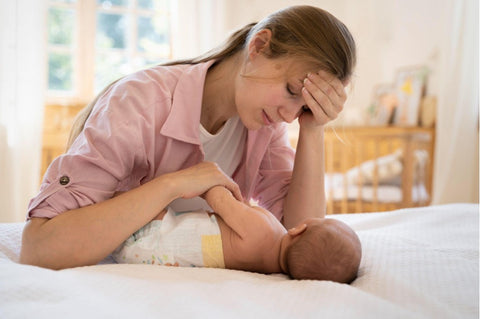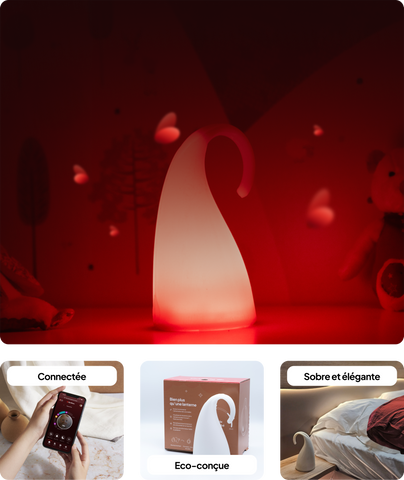What is baby blues?
The baby blues affects 80% of new mothers in the days following childbirth, usually between the 2nd and 5th day. It is a normal emotional reaction that generally disappears after two weeks. So there is no need to worry, but it is important to know how to recognize it and take action to better cope with it.
Causes and symptoms of baby blues
The causes of the baby blues are multiple and can be of psychological or biological origin:
- Hormonal drop: The drop in hormones, especially progesterone and estrogen, after childbirth
- Extreme fatigue due to pregnancy and childbirth
- Pregnancy and/or difficult childbirth
- Adapting to changes: new responsibilities, family reorganizations, etc.
- Lack of emotional support: whether from partner or family.
These factors explain why so many women are affected by the baby blues. The symptoms are also varied:
- Mood swings
- Sleep disorders
- Anxiety
- General fatigue
- Irritability
- Feeling of fragility
- Difficulty bonding with baby
- Eating disorders
Good to know: In case of persistent fatigue, it is useful to understand how sleep cycles work to improve the quality of your nights.
If you recognize these symptoms in yourself, it is likely that you are experiencing the baby blues. Don't worry, this phenomenon is temporary and there are simple ways to overcome it. ByeBlues has some tips for you to combat the baby blues.
How to avoid the baby blues?
Here are some tips to help you fight baby and prevent the situation from getting worse:
- Get some fresh air regularly: A walk in the fresh air can do wonders for your morale.

- Do an activity you enjoy: Listen to music, cook or watch your favorite movie.
- Talking about your feelings to your loved ones or your partner: expressing what you feel can relieve a lot of tension. They are there to listen and support you.
- Have self-confidence: Becoming a mother is something you learn, give yourself time to adapt.
The baby blues are a temporary condition, but be careful if the symptoms persist beyond two weeks, it could be postpartum depression.
Postpartum depression: a disorder not to be ignored
What is postpartum depression?
Postpartum depression, or postnatal depression, affects between 10% and 20% of mothers after giving birth. Unlike the baby blues, this condition can last for several months and requires special attention. The latter is therefore considered an illness and must be treated as quickly as possible so that it does not get longer.
Causes and Symptoms of Postpartum Depression
As with the baby blues, several factors can cause postpartum depression:
- Hormonal drop after childbirth, similar to the baby blues, but with more prolonged effects
- Breastfeeding: Hormonal changes associated with breastfeeding can make the situation worse.
- Relationship problems: Stress and new responsibilities can create tension, stress…
- Feeling of emptiness or bodily discomfort after childbirth.
- Life change: Fear of new responsibilities, of not being up to it.
Symptoms of postpartum depression are numerous and affect both the mind and the body:
Emotional symptoms: Persistent sadness, feelings of worthlessness, intense guilt.
Cognitive symptoms: Feeling confused, loss of interest in usual activities, difficulty concentrating.
Physical symptoms: Sleep disturbances, appetite disturbances, extreme fatigue.
Note that postpartum depression is diagnosed when at least 5 of these symptoms are present for more than 15 days, and one of them is a depressed mood or a loss of interest and pleasure.
It is crucial not to underestimate these symptoms and to consult a health professional quickly to obtain appropriate treatment. Postpartum depression is not to be taken lightly, it is a real mental illness that requires treatment.
Baby Blues and Postpartum Depression in Dads
 Fathers, although less talked about, can also suffer from baby blues or postpartum depression. It is estimated that 2 out of 10 fathers are affected by postpartum depression, but do not dare to talk about it. Already taboo among women, this subject is even more so among men and yet, it is also important that they are treated. Men do not experience the same physical changes as women, but they can still experience:
Fathers, although less talked about, can also suffer from baby blues or postpartum depression. It is estimated that 2 out of 10 fathers are affected by postpartum depression, but do not dare to talk about it. Already taboo among women, this subject is even more so among men and yet, it is also important that they are treated. Men do not experience the same physical changes as women, but they can still experience:
- New responsibilities
- Emotional shock
- Role questioning
- Intense fatigue
In men, postpartum depression may manifest as excessive anger, excessive alcohol consumption, anxiety, or impatient behavior.
No parent should be ashamed of these feelings, of suffering from baby blues or postpartum depression. It is essential to talk about it and seek help, for yourself, for the couple, and for the well-being of the baby.
Who to contact in case of depression or baby blues?
Whether you are a mom or a dad, it is important not to face these challenges alone. Here are the resources you can contact for support:
- Your pediatrician
- Your midwife
- Your doctor
- The Maternal and Child Protection Center: https://www.nos-services.com/pmi
- Associations for mothers: for example, the Maman Blues association
- Associations for dads: for example, the APSEF association or the future dad workshop https://www.atelierdufuturpapa.com/ .
Taking care of your mental health after the birth of your child is just as crucial as looking after your physical well-being. Whether you’re a mom or a dad, it’s important not to ignore the signs of baby blues or postpartum depression. These feelings are not a weakness, but a natural response to the emotional and hormonal upheavals you’re going through.
Don’t face these challenges alone. There are many professionals and resources ready to support you, listen to you, and walk alongside you during this difficult time. By seeking help early, you can not only improve your own well-being, but also create a healthier and more stable environment for your baby and your family. Asking for help is a first step towards healing.
Now you know the differences between the baby blues and postpartum depression. If you or someone you know is going through one of these states, do not hesitate to talk about it and seek support. The birth of a child changes many things. It is important to make sure that the mother and father feel good, because their well-being is essential for their relationship and for the development of the baby.




